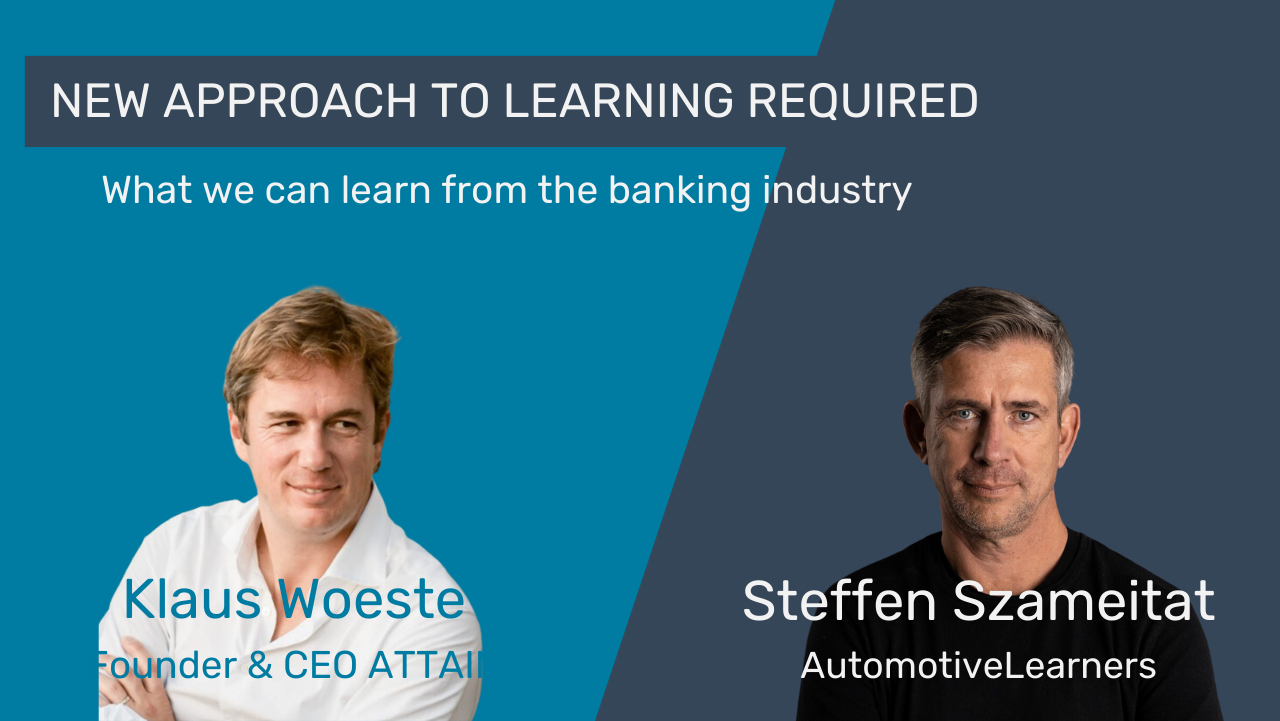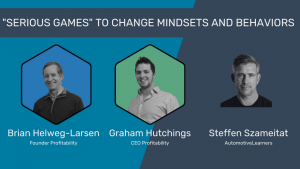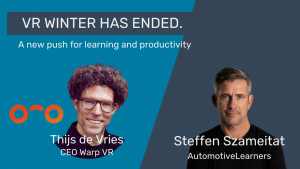Reading time: 7 minutes
Learning in large companies is often irrelevant, boring, and still mandatory.
To change this, Klaus Woeste founded ATTAIN. ATTAIN consists of a team of learning experts and bank managers and offers learning programmes for banks. The customer feedback is outstanding.
Like the auto industry, the banking industry has gone through various upheavals. What can we learn from the banking industry?
Klaus, what is your dream car?
There is a racing version of the Porsche 356, the Carrera 2 2000GS, which has a 2-liter engine with four camshafts on four cylinders. This is a special car, only a few hundred of them were built. This is my dream car.
Why did you become an entrepreneur?
I can boil this down to 3 words: Innovation, Purpose, Impact.
Just like you, I worked in corporations for 20 years. And we have found repeatedly: if you really want to have an impact in your profession, if you really want to do something meaningful, then that is hard to find in corporate.
You must adapt to the company’s goals and fully support them; if you want real innovation, this is often difficult. Innovation is driven by individuality, flexibility, and agility, which corporations are not. If you want to make an impact in the modern world, it is also difficult.
That is why I became an entrepreneur. Innovation, Purpose, Impact.
You have been in banking for 20 years. What are the key differences between the auto industry and banking?
There are differences, but also a lot in common.
The first significant difference is that banking is up to 99% white collar (office workers), and in the automotive sector, the music plays in production and development, where physical products are created.
The main difference with Auto is that it is a banking product that everyone knows and that everyone has. But no one really has a positive, emotional relationship with their bank. No one is now saying, “Wow, great! I have this new checking account, and it’s so cool. I go online every day.”
With the car, you have an emotional product. This makes a stark difference in the company culture and the people you find in these industries.
But there are many similarities.
For both industries, they have not actually been going through a constant, but steady transformation process for 5 or 10 years. And you read a lot about how the step to the electrified car is changing the whole industry, supply chain, development, sales, etc.
It should not be forgotten that the banking industry has already been through this.
They have switched from a physical business model to a digital business model. Every year, 200 branches are closed here in the UK. That is just as much of a challenge as the step towards electrification. So, both industries are going through an incredible transformation; in the products they offer, how they offer them, how they interact with their customers, etc.

In this respect, the two industries are actually very comparable, although I would say that the financial industry as a whole has made the step towards digitalization for non-physical products and non-physical interaction with customers more quickly.
What does this mean for learning?
Business processes and business models have changed fundamentally in banking. And they are also fundamentally changing cars. This completely changes the role requirements. The structure, the composition, the composition of the skills, and how they are distributed among the separate roles in the company are changing fundamentally.
For example, there is no longer a branch manager because there are no more branches. That used to be an extremely vital role, and he has an entire range of skills. That was a business manager. But you do not need these skills anymore.
On the other hand, you now have many more skills in the field of digital product development, etc. However, certain skills and roles are gone forever. You do not need it anymore.
What is fundamentally different for learning in transformation are two things.
In the past, you defined a role, for example, branch manager. They were there for the next 20 years. And then you were able to train incrementally for 20 years to change things every now and then. Sometimes there was a new system for lending or a new system for selling. But the role was the same.
Today, roles are changing faster, and even within a role, the changes are much stronger. And this brings us to this principle of “life-long learning.”. Continuous, effective training for my job and “on the job” is therefore essential today
However, this requires a completely different learning function in the companies, which is much more agile, works much more proactively with the business, and together with the business, proactively recognises these fundamental skills changes and then implements them.
The next generation, which is now coming into the company, learns in a completely unique way. They no longer sit in school for an hour and listen to the teacher. They are told something for 5 minutes and try it out immediately.
And we see that in our game, in our product.
We get fantastic feedback for our learning experiences. 97% of all learners who use our products find this new way of learning and “experiencing” learning better than the training currently offered to them in their companies. If we play this with Generation Z, i.e., with graduates who are under 25, then we really have 100% satisfaction. 100% satisfaction means 100% want more training. Gen Z has a completely different approach and expectations, and that is where our play- and experience-based learning principle just fits.
And if you bring the two together, this much faster skill and role change and these changes in how we learn and why we learn, then you have something to do.
That already talked about the product, that something is different. What do you do differently at ATTAIN?
In my 20 years in the corporate world, I have noticed one important but controversial mechanism.
Due to economic and organizational constraints, the design process often starts with: How many people do we need to train? How much money do we have? How much time do we have?
But employees do not learn that way. Employees do not learn because there is something that only costs £50, it takes half an hour, and that is what 10,000 others do. Employees learn because they are curious, because they want to get better at their job, because they want to develop a skill. And people learn completely differently. They learn by trying something out: give them a set of Lego bricks, they put it together, it does not work, reassemble it. We learn best experientially, through play, and in interaction with others.
Attain has taken these principles as his own. Every learning experience we create is built on 5 principles
Purpose, Social, Application, Variety und Fun.
We believe people learn much better, more effectively, faster, and better with each other and collectively if you apply these learning principles.
How will we learn in 10 years?
If I knew that, I would be a billionaire (laughs).
How we will learn in 10 years, people like me cannot predict that. That is what Generation Z will tell us. We are driven. Those who enter the workforce now will determine how we learn and educate ourselves in 10 years.
They will show us how they want to learn.
If you were writing a letter to the CEOs of the auto industry, what message would you give them?
The collective ability to innovate and the collective ability to change of the employees in these companies is much greater than the board members and managers believe.
I would recommend to the boards and the executives that they simply put a lot more money into it and a lot more focus on how it really sees this collective innovation and change power. Simply with the power of the incredible human capital that we have in Europe due to an infinite number of diverse cultures and infinitely different capabilities. We have all of this in Europe, in a greater variety than you even have in the USA or Asia.
We just need to work better together and really uncover the lever for creativity and change.




